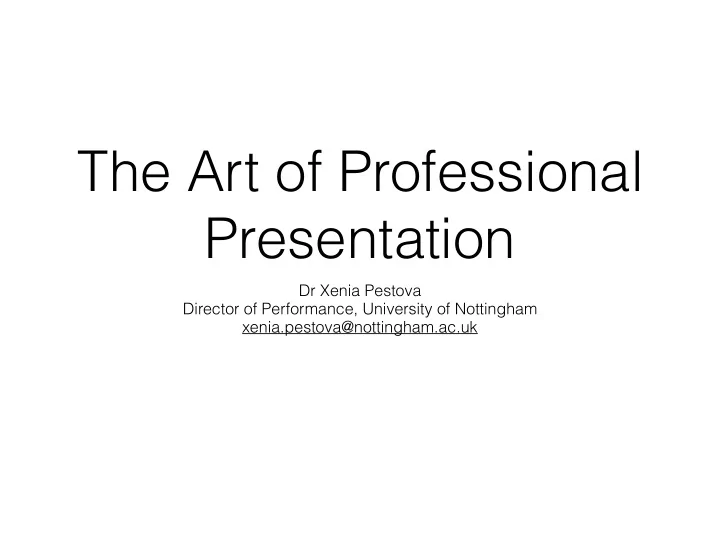

The Art of Professional Presentation Dr Xenia Pestova Director of Performance, University of Nottingham xenia.pestova@nottingham.ac.uk
Performance Anxiety • What is it? • My experience • Some ideas • Routines, mindful approaches, lifestyle implications • Resources
What is it? • Natural response to a perceived threat (fight-or- flight: Walter Cannon, American physiologist) • Linked to stress • Physiological symptoms: • Rapid / irregular heartbeat, fast / shallow breathing, weakness, tension, sweating, digestion problems, dry mouth, trembling, ...
My experience • Playing (difficult) music (at times prepared under a very tight deadline) in professional concert settings for about 20 years • Musical performance: unpredictable patterns of performance anxiety • Never completely gone • Adrenaline can enhance experience: in the moment, alive, connected
Some Ideas • Pre-performance routines • "Backstage mode" - uphold an inner smile, move and speak calmly, be mindful of breath (Klickstein) • Warm up physically before public speaking to interrupt the cycle of stress and relax tight muscles (Robin and Balter) • During: positive outlook, positive self-talk • Difference between performing and practicing: looking forward rather than backwards! • Post-performance routines (Klickstein) • Cool down, assess and move ahead • Positive self-talk
Some Ideas • Breathing routines and grounding approaches: • Effective breathing - a tool in your anxiety reduction toolkit (counteract shallow fast breaths: tissue box exercise; Robin and Balter) • Awareness of anatomy and the breathing apparatus (Donna Farhi) • Breathing enquiry exercises • Alexander Technique • Tai Chi and Qi Gong • Yoga
Some Ideas • Holistic thinking, mindfulness, being in the moment • Acceptance of the body and things as they are, observing without reacting • General lifestyle adjustments to control anxiety • "Mindful computing" - extending our bodies with technology rather than overloading them (Alex Pang)
Some Ideas • Ultimately: the only way forward is through - DO IT as much as possible to identify coping strategies. • Arrange opportunities to practice in safe contexts • While it may never go away completely, anxiety DOES diminish. • Familiarity with your material helps, and so does being passionate about it! • Mental practice and visualisation also effective • Observe effective performance in different fields - attend talks, conferences, musical performances with inspiring professionals
Nottingham Forum for Artistic Research (Free entry, free wine & mince pies on December 9!) www.nottingham.ac.uk/go/ NottFAR
Resources • Web: • Beyond Stage Fright http://www.beyondstagefright.com • Bulletproof Musician http://www.bulletproofmusician.com/ • Books: • Farhi, Donna. The Breathing Book • Klickstein, Gerald. The Musician's Way: a Guide to Practice, Performance and Wellness • Pang, Alex Soojong-Kim. The Distraction Addiction: Getting the Information You Need and the Communication You Want, Without Enraging Your Family, Annoying Your Colleagues, and Destroying Your Soul • Robin, Mitchell W. and Rochelle Balter. Performance Anxiety • Williams, Mark and Danny Penman. Mindfulness: a Practical Guide to Finding Peace in a Frantic World
Recommend
More recommend